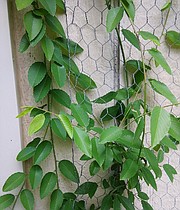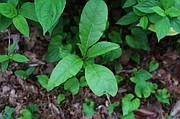Q: I just read an article on Pinterest about using Epsom salts on hostas to help them grow "bushier," deepen the green color, and that it's also good for slug control. I am curious if you know anything about this. I would sure hate to kill my plant.
A: Many gardeners swear by Epsom salts for roses and magnolias, tomatoes and more. Epsom salts is magnesium sulfate. Magnesium and sulfur are both nutrients that plants need to grow. Is Epsom salts the cure-all for all plants? Not really. If your soil is low in magnesium or sulfur it will help them grow better. It can be added with other fertilizers or used as a stand-alone application, but as with any fertilizer, it is a salt, and you don't want to get carried away with it. I would be surprised if it kept the slugs away. It will not kill your plant unless you dump the bag on it.
Q: Do you have any experience with Carex species or Juncus tenuis or Danthonia spicata? I want a grass alternative. I am gradually eliminating the motley grasses because I do not want a green expanse, the green carpet that most folks desire. I am planting flower beds and wildflowers in Northwest Arkansas. I need something to hold the soil between and among the wildflowers when they go dormant. Most definitely I will be sowing Buchloe dactyloides, but I prefer to not have a monoculture. I do not expect to have much area with just "grass."
A: I do like Carex or sedges a lot, and there are quite a few nice varieties, some with variegated foliage. Be sure you read up on the variety you buy as some like a lot of moisture while others are more tolerant of dry conditions. There are many species. They can be slow to spread at first but will spread once established. Most prefer some protection from hot afternoon sun. Juncus, or slender rush, in my opinion, is a weed and I would not plant it. Danthonia is commonly called poverty oat grass and it is an Arkansas native. It should do well. Other grasses to consider are one of the bluestems (Andropogon or Schizachyrium) or Sideoats grama (Bouteloua). The University of Arkansas turf program is experimenting with buffalo grass (Buchloe dactyloides) with fairly good results. We have not had as much success in central and southern Arkansas, but as you are in Northwest Arkansas, it might be a good option for you. It does not like a lot of irrigation.
Q: Can you tell me the name of this vine? It came up volunteer in my garden. Thank you for any information you can give me.
A: The vine in question is a native woody vine Berchemia scandens, commonly called rattan vine or supple-jack. It is a member of the buckthorn family. It has tough stems, greenish-white flowers and blue fruits. The woody older stems can be used to make furniture similar to rattan furniture, thus the common name. The vine can grow into neighboring trees and shrubs and girdle their stems. Keep it trained to a trellis or arbor if you want to keep it, as it can spread quite prolifically.
Q: Can you please identify this for me? I have seen this as tall as 18- to 24-inches along the fence on my neighbor's property. Those have a widened or tuberous root.
A: The weed in question is poke salad or poke weed (Phytolacca americana). It can grow up to 5 feet tall and bloom, then produce clusters of purple berries. Some people eat the tender greens, but do be aware that the plant is poisonous. Most food authorities do not recommend eating it ever, but people in the South have been eating (and surviving for years). If eating it, you should use only the tender new foliage: cook it, rinse it, repeat twice and then eat. I ate it once and did not like it. In Europe, the plant is cultivated as an ornamental for the cluster of berries. Europeans keep it pruned and shaped into a shrub. It has the tendency to spread easily in Arkansas.
Retired after 38 years with the University of Arkansas Cooperative Extension Service, Janet Carson ranks among Arkansas' best known horticulture experts. Her blog is at arkansasonline.com/planitjanet. Write to her at P.O. Box 2221, Little Rock, AR 72203 or email
jcarson@arkansasonline.com
HomeStyle on 06/29/2019


